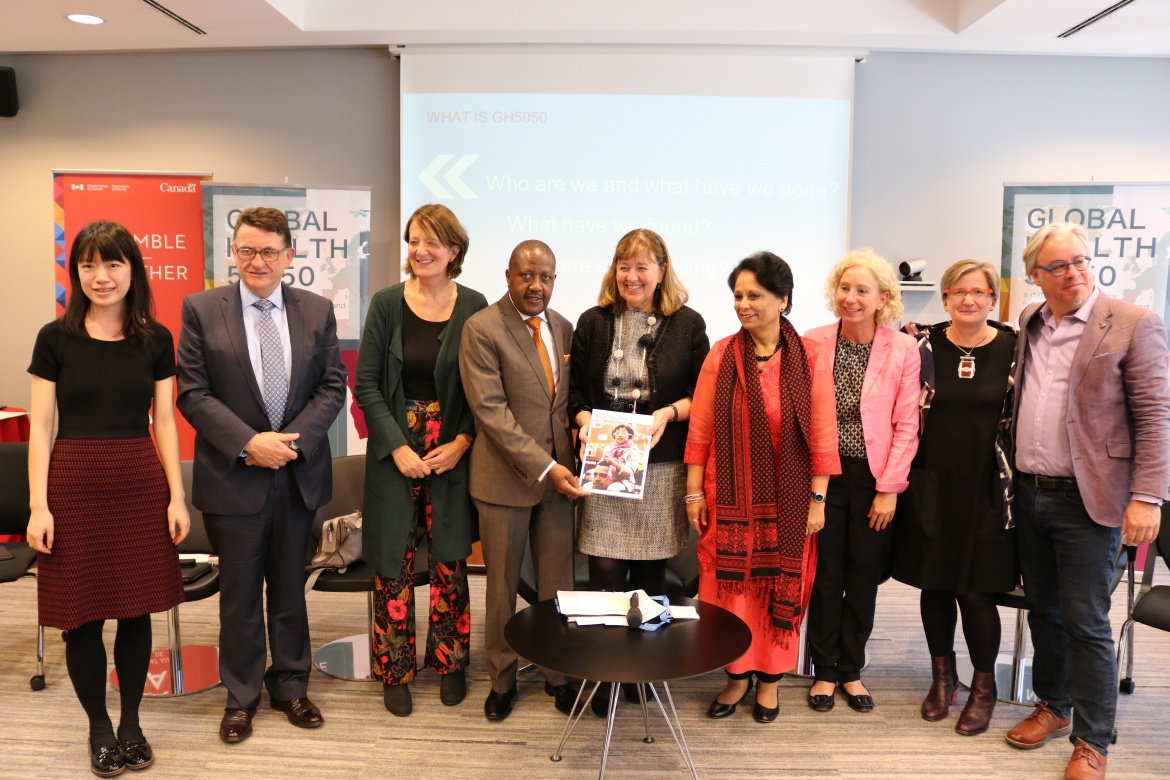Add women and stir? Moving beyond parity to transform the workplace and shape truly feminist organisations
A short report on the event ‘How do we get to 50/50? Towards feminist global health organisations’ hosted by Canada and Namibia on the sidelines of the 72nd World Health Assembly
Geneva, 23 May 2019
Approximately 100 delegates to the World Health Assembly (WHA) and Geneva-based health and development experts gathered on the sidelines of the 72nd WHA to explore the findings of the 2019 Global Health 50/50 Report and discuss challenges and solutions to fostering more equitable and inclusive global health organisations. The event, hosted by the Ambassadors of Canada and Namibia, sought to promote a gender lens to WHA proceedings and press global health leaders for action.
Ambassador McCarney of Canada and Ambassador Naanda of Namibia opened the event, sharing recent progress in their countries in developing feminist domestic and international aid policies. Professor Sarah Hawkes, GH5050 co-lead, presented the findings of the 2019 Report, which included persistent gender pay gaps, inadequate policies on parental leave, sexual harassment and flexible working, and a systemic absence of women in leadership roles.
“We chose a deliberately provocative title for the event’ says Kent Buse, GH5050 co-lead, “as we wanted the conversation to get beyond the numbers to feminist issues of intersectionality, norms and power in these global organisations, and the panelists didn’t disappoint.”
Panelists Anuradha Gupta (Gavi), Marijke Wijnroks (Global Fund), Greg Vines (ILO) and Claire Somerville (Graduate Institute), reflected on the findings through their own institutional and sectoral lenses. They updated the audience on recent policy changes and assessments driving gender-responsive progress in their organisations. They explored developing international norms around policies on parental leave, sexual harassment and pay gap reporting. All the panelists cautioned against making a direct correlation between parity and equality, suggesting ‘counting women’ may distract from interrogating the structures that perpetuate patterns of power and privilege. Unanimously they recognized that any examination of gender relations required an intersectional lens, and welcomed GH5050’s announcement that it would expand that area of inquiry in its 2020 report.
A Q&A raised a number of issues that stimulated further discussion – particularly on the lack of men’s interest in gender as well as on gender inequality and aging, and the general dearth of research on the issue. Tiantian Chen, GH5050 researcher, joined the panel during the Q&A and spoke to her ongoing research on gender, fertility and aging in China.
In closing the event, Ambassadors McCarney and Naanda recognised the applicability of the GH5050 methodology beyond the health sector and urged participants to use the report as a vital tool to push for accountability and change towards more feminist global organisations.
Quotes
“This event marks an important milestone on the road to Women Deliver and the second anniversary of Canada’s Feminist International Assistance Policy. The Global Health 50/50 Report outlines very clearly the dimensions of a gender-equal and gender-responsive organisation and provides us the data so that organisations can do better. I urge everyone to embrace its findings, use the evidence and let it be an accountability mechanism for us all.”
H.E. Rosemary McCarney, Permanent Representative of Canada to the United Nations
“Gender equality is at the heart of Namibia’s policy agenda. The country provides a strong example across the African continent of how committed leadership and the right policies and programmes can deliver greater equality – in the workplace, in government and throughout society.”
H.E. Penda Naanda, Permanent Representative of Namibia to the United Nations
“The Global Fund is pleased to be a GH5050 high performer and fully committed to promoting gender equity. Gender equality is a challenge across sectors and countries – and increasingly a priority among young people today. I am optimistic that with the leadership of the next generation, global health will be more equitable, inclusive and just.”
Marijke Wijnroks, Chief of Staff, Global Fund to Fight AIDS, Tuberculosis and Malaria
“Gender equality relies on much more than an ‘add women and stir’ approach. Parity is a noble goal but in itself does not mean equality. We need feminist methodologies and accountability mechanisms like Global Health 50/50 to confront and transform patriarchal structures and organisations.”
Claire Somerville, Executive Director, Gender Centre at the Graduate of Institute of International and Development Studies
“International labour standards are designed to ensure that economic development is focused on improving human life and dignity – we have global standards around maternity protection, equal pay and discrimination. Yet progress has been slow – today only 45% of women are employed compared to 71% of men. ILO is calling for a transformative agenda for gender equality – demanding action from parental leave to investment in public care services.”
Greg Vines, Deputy Director-General, ILO
“Gavi is honoured to be recognized as a GH5050 high performer. We follow a framework of the ‘6 R’s’ to ensure gender equality is mainstreamed in all that we do. These include: Recruitment (ensuring parity in senior levels), Remuneration (Gavi is Equal Salary Certified), Recognition and rewards (e.g. performance ratings, promotions), Respect (including respectful workplace policies), Reporting (and systematic monitoring) and Reinforcement (through consistent communication with staff).”
Anuradha Gupta, Deputy CEO, Gavi Alliance


